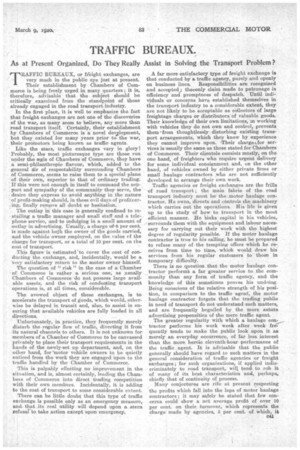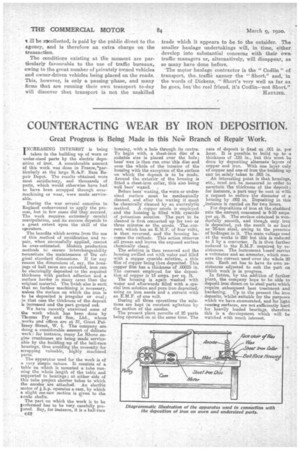TRAFFIC BUREAUX.
Page 21

Page 22

If you've noticed an error in this article please click here to report it so we can fix it.
As at Present Organized, Do They Really Assist in Solving the Transport Problem?
RAFFIC BUREAUX, or Weight exchanges, are very much in the public eye just at present. Their establishment by Chambers of Com merce is being freely urged in many quarters; it is, therefore, advisable that the subject should be critically examined from the standpoint of those already engaged in the road transport industry.
In the first place, it is well to emphasize the fact that freight exchanges are not one of the discoveries of the war, as many seem to believe, any more than road transport itself. Certainly, their establishment by Chambers of Commerce is a novel development, but they existed for many years prior to the war, their protectors being known as traffic agents.
• Like the stars, traffic exchanges vary in glory !
• Probably, the most picturesque type are those run under the wgis of Chambers of Commerce, they have a semi-philanthropic flavour, which, added to the general dir of respectability surrounding Chambers of Commerce, seems to raise them to a special plane of their own, superior to that of ordinary trading. If this were not enough in itself to command the sup, port and sympathy of the community they serve, the• they express to avoid anything in the nature of profit-making should, in these evil days of profiteering, finally remove all doubt or hesitation.
• The outlay in this case is generally confined to installing a traffic manager and small staff and a telephone service, and-to indulging in a small amount of outlay in advertising. Usually, a charge of 5 per cent. is made against both the owner of the goods carried, and the vehicle owner employed, on the value of the charge for transport, or a total of 10 per cent, on the cost of transport.
This figure is estimated 'to cover the cost of conducting the exchange, and, incidentally, would be a very satisfactory return to the motor owner himself.
The question of " risk " in the case of a Chamber of Commerce is rather a. serious one, as usually Chambers of Commerce do not possess large available assets, and the risk of conducting transport • operations is, at all times, considerable.
The avowed object of these exchanges, is to accelerate the transport of goods, which would, otherwise be delayed in transit and, also, to assist in ensuring that available vehicles are fully loaded in all directions.
'Unfortunately, in practice, they frequently merely disturb the regular flow of traffic, diverting it from its natural channels to others. It is not unknown for members of a Chamber of Commerce to be canvassed privately to place their transport requirements in the hands of the newly-set up department, and, on the other hand, for 'motor vehicle owners to be quietly enticed from the work they are engaged upon to the traffic handled by the Chamber of Commerce.
This is palpably effecting no improvement in the situation, and is, almost certainly, leading the Chambers of Commerce into direct trading competition with their own members. Incidentally, it is adding to the cost of transport to some considerable extent.
There can be little doubt that this type of traffic exchange is possible only as an emergency measure, andthat its real utility will depend upon a stern refusal to take action except upon emergency. A far more satisfactory type of freight exchange is that conducted by a traffic agency, purely and openly on business lines. Responsibilities are recognized and accepted; thesonly claim made to patronage is efficiency and promptness of despatch. Until individuals or concerns have established themselves in the transport industry to a considerable extent, they are not likely to be acceptable as deflectors of large freightage charges or distributors'of valuable goods. Their knowledge of their own limitations, in working with vehicles they do not own and control, prevents them-from thoughtlessly disturbing existing transport arrangements, which they know by experience they cannot improve upon. Their charge‘for services is usually the same as those stated for Chambers of Commerce. Their clientele consists mostly, on the one hand, of freighters who require urgent delivery for some individual consignment and, on the other hand, of vehicles owned by either private firms or small haulage contractors who are not sufficiently developed to arrange their own work.
Traffic agencies or freight exchanges are the frills of road transport ; the main fabric of the road transport industry must be the .motor haulage contractor. He owns, directs and controls the machinery which carries out the operations. His life is given up to the study of how to transport in the most efficient manner. He 'sinks capital in his vehicles, /surrounds them with the equipment and labour neces sary for carrying out their work with the highest degree of regularity possible. If the motor haulage contractor is true to his calling, he must be prepared to refuse many of the tempting offers which he receives from time to time, which would draw his services from his regular customers to those in temporary difficulty.
There is no question that the motor haulage con tractor performS a far greater service to the community than any form of traffic agency, andthe knowledge of this sometimes proves his undoing. Being conscious of the relative strength of his position, in comparison to the traffic agent, the motor haulage contractor forgets that the trading public in need of transport do not understand such matters, and are frequently beguiled by the more astute advertising propensities of the mere traffic agent.
The greater regularity with which a haulage con tractor performs his work week after week fie): quently tends to make the public look upon it as merely an everyday occurrence, of far less interest than the more heroic eleventh-hour performance of the traffic agent. It is advisable that the public generally should have regard to such matters in the general consideration of traffic agencies or freight exchanges ; for such organizations if applied indis criminately to road transport, will tend to rob it of ma-ny of its best characteristics and, perhaps, chiefly that of continuity cif process.
Many conjectures are rife at present respecting the profits which fall into the laps of motor haulage contractors ; it may safely be stated that few concerns could show a net average profit of over 10 per cent, on their turnover, which represents the charge made by agencies, 5 per cent. of which, it v. ill be recollected, is paid by the public direct to the agency, and is therefore an extra charge on the transaction.
The conditions existing at the moment are particularly favourable to the use of traffic bureaux, owing to the great number of privately Owned vehicles and owner-driven vehicles being placed on the roads. This, however, is only a passing -phase, and many firms that are running their own transport to-day will discover that transport is not the unskilled trade which it appears to be to the outsider. The smaller haulage undertakings will, in time, either develop into substantial concerns with their own traffic managers or, alternatively, will disappear, as so many have done before.
The motor haulage contractor is the " Codlin " of transport, the traffic agency the "Short." and, in the words of Dickens, " Short's very well as far as he goes, but the real friend, it's Codlin—not Short,"
HAULIER.


























